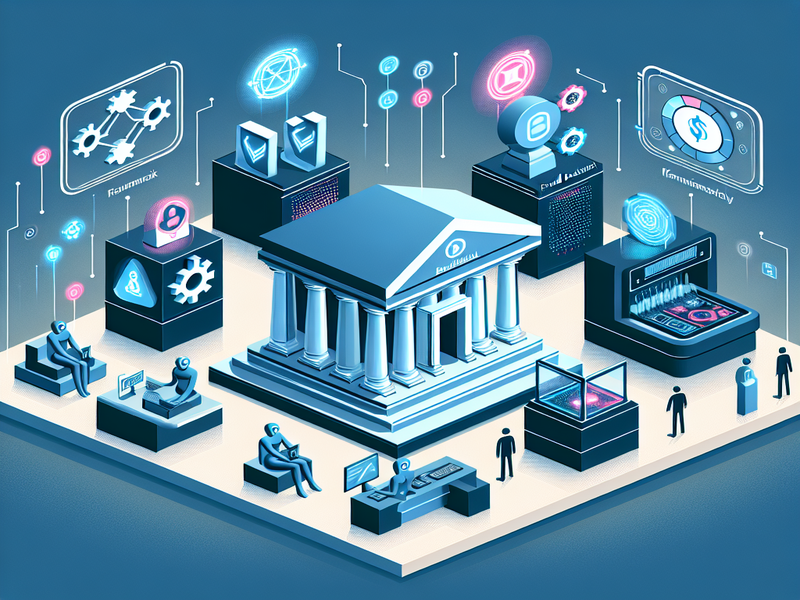Introduction to AI in Financial Services
Artificial Intelligence (AI) is revolutionizing the financial services industry, bringing unprecedented advancements in efficiency, accuracy, and customer satisfaction. From automating routine tasks to enhancing decision-making processes, AI is becoming an integral part of modern banking. Financial institutions are leveraging AI to streamline operations, improve risk management, and offer personalized services to customers.
Key Banking Functions Enhanced by AI
AI is transforming several key banking functions, including:
- Risk Management: AI algorithms can analyze vast amounts of data to identify potential risks and predict future trends, enabling banks to make informed decisions.
- Fraud Detection: AI systems can detect unusual patterns and flag suspicious activities in real-time, significantly reducing the incidence of fraud.
- Customer Service: AI-powered chatbots and virtual assistants provide 24/7 support, answering customer queries and resolving issues promptly.
- Loan Processing: AI can assess creditworthiness more accurately and quickly, speeding up the loan approval process.
- Investment Management: AI-driven robo-advisors offer personalized investment advice, helping customers make better financial decisions.
Existing AI Implementations in Banking
Banks worldwide are already implementing AI in various ways:
- AI in Risk Management: AI models are used to predict market trends and assess credit risks.
- AI in Fraud Detection: Machine learning algorithms detect and prevent fraudulent transactions.
- AI in Customer Service: Virtual assistants and chatbots handle customer inquiries efficiently.
- AI in Compliance: AI tools help ensure regulatory compliance by monitoring transactions and flagging suspicious activities.
Five Key Points on Why GenAI is Different and Brings Value Faster
Generative AI (GenAI) stands out from traditional AI due to its unique capabilities:
- Content Creation: GenAI can generate new content from input instructions, including text, images, and even code.
- Enhanced Productivity: By automating creative processes, GenAI frees up human resources for more strategic tasks.
- Versatility: GenAI can be applied across various industries, from finance to healthcare, enhancing productivity and innovation.
- Rapid Advancements: The pace of GenAI development is exponential, with new capabilities emerging regularly.
- Improved Customer Experience: GenAI-powered tools offer personalized and efficient customer interactions, enhancing satisfaction.
Learnings for CIBC Use Cases
CIBC has been at the forefront of AI adoption, implementing various pilot programs to explore the potential of GenAI. Their approach includes:
- Knowledge Central Chatbot: A GenAI-powered chatbot that assists in answering common client inquiries, reducing call escalation times.
- GitHub Copilot for Developers: This tool enhances developer productivity by acting as a pair programmer.
- Office Copilot for Knowledge Workers: This tool improves productivity by assisting in note-taking and post-meeting activities.
- CIBC-AI: A proprietary tool similar to ChatGPT, designed to provide task-specific assistance and deeper analysis capabilities.
Importance of Starting Light with Pilots
Starting with pilot programs is crucial for understanding the potential benefits and challenges of AI implementations. Pilots allow financial institutions to:
- Test AI tools in a controlled environment.
- Gather feedback and refine the technology.
- Ensure regulatory compliance and manage risks effectively.
- Scale successful pilots to broader applications.
Factors for Deciding Between Vendor Solutions and Bespoke Solutions
When deciding between vendor solutions and bespoke (custom-built) solutions, consider the following factors:
- Integration: How well the solution integrates with existing workflows.
- Ease of Use: The intuitiveness of the software for end-users.
- Specific Use Cases: The expertise of the vendor in addressing specific business needs.
- Risk Management: The vendor’s approach to managing risks and regulatory compliance.
- Cost: Weighing the licensing fees of vendor solutions against the development and maintenance costs of bespoke solutions.
Conclusion
AI is undoubtedly transforming the financial services industry, offering numerous benefits across various banking functions. By starting with pilot programs and carefully considering the choice between vendor and bespoke solutions, financial institutions can harness the power of AI to enhance efficiency, improve customer service, and drive innovation. The rapid advancements in GenAI, in particular, promise to bring value faster and more effectively, making it a game-changer in the industry.

